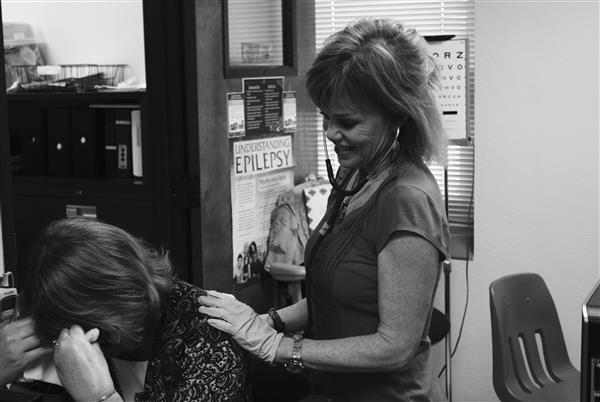Since Thomas Duncan traveled to Dallas and was diagnosed with Ebola and two nurses subsequently became infected, Ebola has become a major topic of discussion across the country. The presence of this deadly virus in the North Texas community has caused several schools to be temporarily closed, and has forced even those who are at a very low risk into quarantine.
Ebola vs. other viruses
While Ebola is the virus making headlines, the flu and enterovirus are also causes of concern. The enterovirus affects the respiratory system and is particularly rampant in children. It is the biggest threat to students who have preexisting respiratory conditions, such as asthma. On the other hand, according to the Word Health Organization, Ebola has a 50 percent fatality rate. The United States has had four cases and one death. Though the enterovirus and Ebola are seen as the most alarming threats, approximately 36,000 people die of the flu each year. Nurse Margot Boyd said she believes the biggest danger ultimately isn’t Ebola.
“[The most dangerous] is really probably the flu,” Boyd said. “We kind of forget about that in the middle of all this upheaval and the hysteria. That’s really the thing we want to protect against.”
LISD Policy
North Texas school districts have taken several measures to prepare schools in the event of a case of Ebola. The Lewisville Independent School District is not considered at risk for Ebola, but nurses have a protocol they must follow. They will screen students for high temperatures, and will ask questions about recent travel and exposure to family members who have traveled. In addition, the district will not offer excused absences to students who stay home in fear of contracting Ebola.
“All the nurses are going to have at least one set of protective equipment,” Boyd said. “It’s on order right now. So we’ve got at least that at our disposal. We’re [equipped] whether we actually have a case, but are we completely prepared? I’m not sure about that.”
Public Reaction
The sense of panic surrounding Ebola has caused several parents throughout North Texas to keep their children home from school. Misinformation about the virus and how it is spread have caused some to mistake common illness symptoms for Ebola. For example, several parents in a Mississippi middle school kept students home upon learning that the principal had traveled to Zambia, an African country not actually affected by Ebola. Boyd said she recognizes the public’s reaction, but thinks it has gotten out of control.
“I think the panic about Ebola is creating more problems than the actual virus,” Boyd said. “The district has gotten a lot of phone calls about people being afraid [and] people wanting to take their kids out of school.”
Despite the hysteria caused by the news of Ebola, students such as sophomore Alexis Stotler remain unconcerned with the situation. Stotler said she is remaining logical.
“I’m not concerned,” Stotler said. “It is hard to catch, and I am extremely careful about things like drinking after people.”
How is Ebola spread?
Ebola is spread through the direct contact of bodily fluids. These fluids, such as saliva, mucus, or sweat, must touch the eyes, mouth, nose, or open wounds of another person for Ebola to infect them. Contrary to popular belief, Ebola is not an airborne virus and cannot be contracted through coughing or sneezing. Particles of the virus that have been coughed or sneezed and have been suspended in the air are not considered to be threats.
Prevention
The main way to prevent being infected by any virus is through hand washing. Boyd said she also stresses the importance of students staying home when they are sick or have a fever.
“Prevention is really the only way we can manage this,” Boyd said. “I think we have to have a healthy respect for this virus because it is dangerous, and it is deadly, but it is certainly not a pandemic. It is certainly not in mass quantities here in the United States.”







